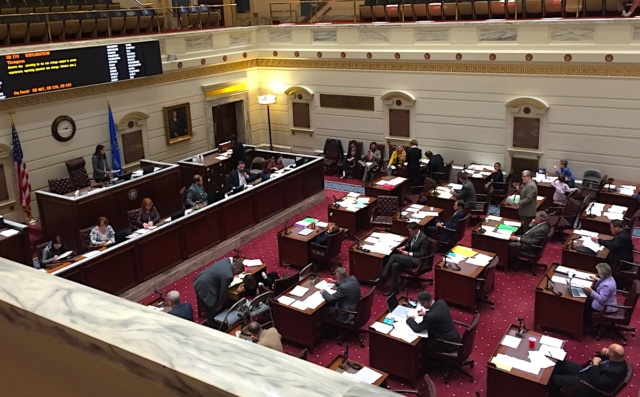

A bill that would repeal a pending income tax-cut trigger passed the Oklahoma Senate this afternoon by a 39-6 vote.
SB 170, by Sen. Roger Thompson (R-Okemah), would repeal Section 2355.1G of Article 23 in Title 68, colloquially referred to as a “trigger.” That statutory section reduced the state’s top income-tax bracket trigger from 5 percent to 4.85 percent.
“We will leave it to a future Legislature to determine whether our income tax rate needs to be cut further,” Thompson said in a quick presentation of his bill on the Senate floor.
He received no questions on the measure, nor did it receive any debate. Those voting against it were Sen. Mark Allen (R-Spiro), Sen. Josh Brecheen (R-Coalgate), Sen. Nathan Dahm (R-Broken Arrow), Sen. Kyle Loveless (R-OKC), Sen. Marty Quinn (R-Owasso) and Sen. Anthony Sykes (R-Moore).
“The voters, I believe, want a low rate and broad base,” Brecheen said after the vote. “I believe we can fund government with the resources we have.”
Brecheen said he thought some agencies could be cut to find savings to fill the state’s nearly $900 million budget hole for next fiscal year.
“The Department of Health is involved in areas that need to be restrained,” he said, declining to elaborate.
SB 130 would maintain trigger, adjust it
Quinn took a different stance in explaining his opposition to the trigger’s repeal. He said he wants to see the trigger remain in law but be adjusted under his SB 130.
“Conservatives are trying to create an environment that’s pro-growth, that’s good for average citizens, that lessens the tax burden on average Oklahomans, and this is a way to continue the process that was voted on years ago,” Quinn said of SB 130. “But it manages it in a much better way. It allows for significant revenue growth before that trigger comes back into play.”
As a result, he voted against SB 170, which repeals the trigger entirely without a replacement plan.
“I didn’t want to see it go away because, just because somebody’s made mistakes in the past about when that trigger kicked in doesn’t mean it’s a bad idea,” Quinn said.
Thompson disagreed.
“With all the revenue failure, we just need to stop digging,” he said. “We estimate it would be about $97 million at this point that we’d have to raise before it would kick in that next trigger. But we just need to quit. We need to quit cutting our revenue so we can meet our expenses.
“I think there’s a great appetite for us to stabilize our income, and that’s what we’re doing here.”
But Thompson said he has heard few specifics from the House so far, where all revenue-raising measures have to start.
“If they don’t do some revenue-raising measures, then we’re looking at either our incentives or cuts,” Thompson said.
Asked whether he would support repealing one of the past income tax cuts, he noted that he was one of a group of senators who attempted to delay a previous income tax trigger last year.
“If it came over here, I’d be willing to take a look at it,” Thompson said of any potential income tax proposal.




















